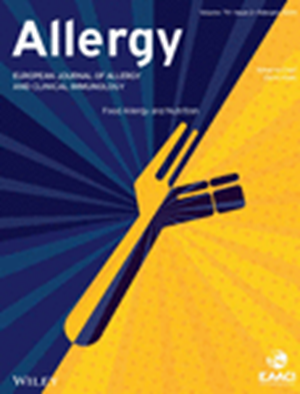Efficacy and Safety of Biologics for Chronic Rhinosinusitis With Nasal Polyps: A Meta‐Analysis of Real‐World Evidence
IF 12.6
1区 医学
Q1 ALLERGY
引用次数: 0
Abstract
Dupilumab, omalizumab, mepolizumab, and benralizumab have demonstrated good efficacy and safety in the treatment of severe uncontrolled chronic rhinosinusitis with nasal polyps (CRSwNP) in phase 3 randomised controlled trials (RCTs). With recent regulatory approvals, there has been a surge in real‐world studies (RWSs). This systematic review and meta‐analysis aimed to summarise the efficacy and safety of these four biologics in real‐world settings. Primary outcomes were nasal polyp score and sino‐nasal outcome test‐22 score. Secondary outcomes included smell identification test score, loss of smell score, nasal congestion score, overall nasal symptom score, treatment response, and adverse events (AEs) prompting discontinuation. Efficacy outcomes at 4, 6, 12, and over 12 months were summarised, and meta‐analyses of mean changes from baseline were conducted. Sixty‐four RWSs involving 3921 patients were included. Significant improvements in clinical outcomes were observed at most follow‐up time points, with dupilumab showing particularly notable effects. The efficacy observed in these RWSs was superior to that demonstrated in phase 3 RCTs. All biologics exhibited low discontinuation rates due to AEs. Overall, biologic treatments for CRSwNP in real‐world settings demonstrate strong efficacy and good safety. However, the limitations in current RWSs highlight the need for long‐term, high‐quality multicentre prospective studies and comprehensive healthcare database analyses.求助全文
约1分钟内获得全文
求助全文
来源期刊

Allergy
医学-过敏
CiteScore
26.10
自引率
9.70%
发文量
393
审稿时长
2 months
期刊介绍:
Allergy is an international and multidisciplinary journal that aims to advance, impact, and communicate all aspects of the discipline of Allergy/Immunology. It publishes original articles, reviews, position papers, guidelines, editorials, news and commentaries, letters to the editors, and correspondences. The journal accepts articles based on their scientific merit and quality.
Allergy seeks to maintain contact between basic and clinical Allergy/Immunology and encourages contributions from contributors and readers from all countries. In addition to its publication, Allergy also provides abstracting and indexing information. Some of the databases that include Allergy abstracts are Abstracts on Hygiene & Communicable Disease, Academic Search Alumni Edition, AgBiotech News & Information, AGRICOLA Database, Biological Abstracts, PubMed Dietary Supplement Subset, and Global Health, among others.
 求助内容:
求助内容: 应助结果提醒方式:
应助结果提醒方式:


